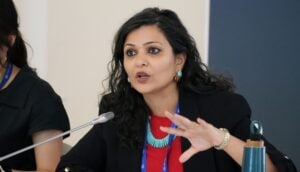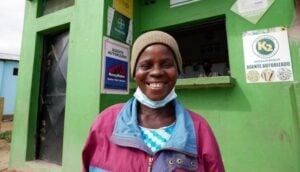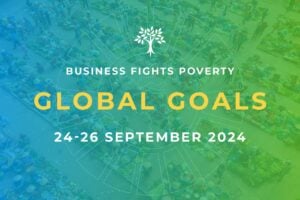Hand in Hand, an NGO specialising in women’s economic empowerment, recently polled 800 our members in Kenya to find out how Covid-19 and subsequent lockdown measures were impacting their businesses. The results, if not entirely surprising, still managed to shock. Incomes had dropped by an average of 67 percent. Savings were down 69 percent and on course to dry up within weeks. A quarter of businesses had closed. And the proportion of people living below the poverty line of US $1.90 a day had nearly doubled, to 83 percent from 44 percent.
Four months ago, the world’s efforts rightly turned to confronting the Covid-19 health crisis. Hand in Hand was no different, downing tools on our regular programmes – providing training, finance and market linkages to informal sector women entrepreneurs from Afghanistan to Zimbabwe – to focus on delivering soap, PPE and virus prevention training to as many vulnerable families as we could.
But reports from across our sector and every corner of the developing world – including our own research in Afghanistan, where coronavirus has already plunged more than a third of the population into acute food insecurity – show we no longer have the luxury of treating coronavirus as only or even principally a health crisis, even as the virus picks up steam. Never mind reversing the spread of coronavirus before moving onto crude economic issues – the time for intervention on livelihoods is right now.
Who, then, will intervene? And how will they do it? Governments in the developing world can’t afford furlough schemes, and most bilateral aid is tied up in health and humanitarian interventions. That leaves us – NGOs and our business community partners – to pick up the slack. Old methods won’t cut it, of course: as Business Fights Poverty so succinctly puts it, we will have to rebuild better. In part that means changing the way our sector delivers its programmes, taking every measure we can to protect our members and staff from Covid-19. But it also means altering our programmes to help members bounce back as strong as they possibly can.
When Hand in Hand asked our members in Kenya where they could most use our support, one response overwhelmingly eclipsed all others: loans to get their enterprises back up and running. But with savings dwindling, assets sold and businesses forced to shutter, the lending environment has drastically changed. For NGOs working in women’s economic empowerment, microfinance and related areas, the challenge is to develop new financial tools that are both flexible and bold enough to confront our unprecedented moment head on – and to measure and share the results as widely as we possibly can. For our part, as a first step, Hand in Hand’s Enterprise Incubation Fund will be upping our loan and term limits, reducing our collateral requirement, and extending our repayment grace periods by a minimum of three months – changes we’ll be measuring, adapting and reporting on as we go.
As for the business community supporters that enable so much of Hand in Hand’s and other NGOs’ work? We urge you to be flexible and bold too. Be patient as your NGO partners downgrade or, more likely, extend project targets. Leverage your position as grant-makers to fund projects that are willing to test new and previously unorthodox interventions. Favour NGOs who are backing up their proposed solutions by evidence that they are listening to the people they serve. Above all else, recognise that responding to coronavirus is about so much more than soap and PPE, necessary as both may be.
As a community that collaborates for social impact, we must not take our eyes off the ongoing and tragic health crisis. But it’s time we expand our vision.
We want to hear what the Business Fights Poverty community is doing to expand its fight against coronavirus. Leave a comment below to join the conversation, or visit the Hand in Hand International website and get in touch with us directly.









